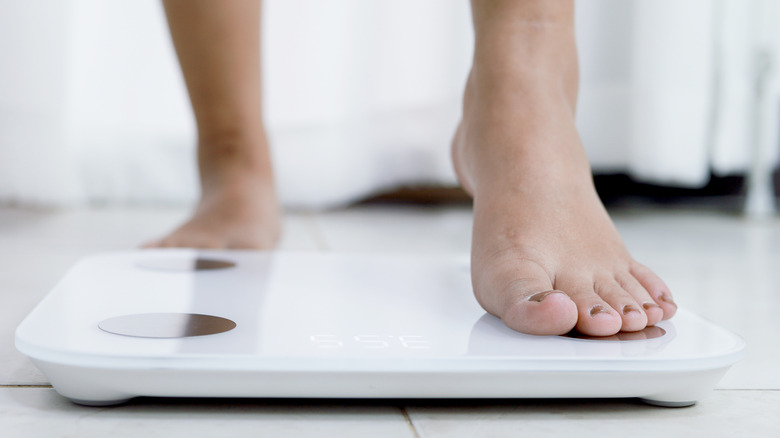Can ADHD Medications Affect Your Weight?
Attention-deficit/hyperactivity disorder (ADHD) is considered a childhood disorder, but its symptoms can last into adulthood (via the Centers for Disease Control and Prevention (CDC)). Children with ADHD tend to daydream, fidget, and can have a hard time waiting for their turn or interacting with others. It can be challenging to determine if a child suffers from ADHD, as there is no one test for the disorder. In addition, other conditions, such as depression, sleeplessness, and anxiety, all share some common symptoms with ADHD.
According to the National Health Services (NHS), the parameters of an ADHD diagnosis require that the child start showing signs of the disorder before the age of 12 and has been showing symptoms for at least six months. Additionally, it's important that the child has been showing symptoms in at least two different locations — such as at home and at school. This helps to rule out the possibility that the child is simply not happy in one or the other location and is acting out in response.
Treatment methods for ADHD include behavioral therapy, counseling, and medication (via Mayo Clinic). The most common medications to combat the disorder are stimulants such as amphetamines, as their ability to boost chemicals in the brain have been shown to positively affect the symptoms. However, people considering medication for ADHD should be wary of the side effects, including changes in weight.
ADHD and obesity are often linked
Even before you take a single dose of medication, WebMD points out that just having ADHD alone might cause you to gain weight. With poor impulse control being a symptom of the disorder, people with ADHD might not be able to resist the urge to reach for junk food or overeat. However, once you go on medication to treat ADHD, you may find your weight beginning to fluctuate.
ADHD medications can, according to the Child Mind Institute, have an impact on a child's appetite, to the point that children on such medication weigh as much as six pounds less than their peers. However, according to a 2014 study by Johns Hopkins Bloomberg School of Public Health, kids whose weight was not impacted in childhood experienced more weight gain than kids who were not on medication.
While stimulants may be the first method of treatment for ADHD, WebMD notes that not everyone responds to them. In those cases, your doctor may consider antidepressants such as monoamine oxidase inhibitors or MAOIs. While these medications may be effective in treating the disorder, weight gain can be a side effect in some cases (via Mayo Clinic).
Lifestyle management can help
According to Children and Adults with Attention-Deficit/Hyperactivity Disorder, weight issues can be a part of a person's struggle with ADHD — with or without medication. A 2013 study in Pediatrics showed that men diagnosed with ADHD in childhood had a higher body mass index than those who did not. And a 2019 study published in Brain Sciences showed that 70% of adults and 40% of ADHD-affected children often have weight issues and obesity.
If you have ADHD, WebMD suggests working against the urge to binge. A good start is keeping high-calorie, sugary foods out of your house in favor of healthier options like fresh fruits and vegetables, nuts, and yogurt. You should also attempt to burn off excess energy with healthy, constructive activities like exercise or yoga. In addition, you should consult with your doctor to find a way to manage your ADHD in a way that's best for you and your health.



